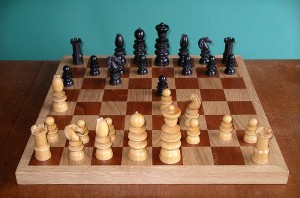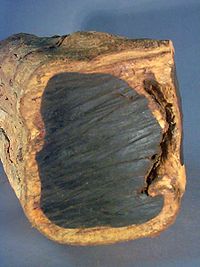I’ve aspired more than once to build a board that looked like this, but it never worked out this well!
Common trade names: Gaboon Ebony, African Ebony, Cameroon Ebony, Nigerian Ebony.
Genus: Diospyros crassiflora
Janka Hardness (pounds-force): 3220
Description: Very hard to work. Quite heavy and dense. None more black. The Ironbarks, by their colorfully marketable names, are used quite a bit in outdoor applications in their native Austrialia. *There is some ambiguity to the specific scientific properties of this species. In any event, there is consensus that this species is extremely dense and hard.
Location: Africa. (Distributed/farmed in Oceania and SE Asia additionally.)
Common Aliases: Kanran, Kayu malam, Kribi ebony, Kurkuo, Mgriti, Msuini, Nyareti, Omenowa, Trayung
Performance: A very durable, high oil content wood. Ebony can be difficult to glue, due to this oily nature. Ebony is resistant to many insects. Will dull cutting blades quickly.
Common Uses: Works of art, fine carvings, chess pieces, piano flats/sharps, pool cues, other ornamental pieces.
About as densely darkened as wood comes without artificial dying.
From: The Wood Explorer
Common Name(s): Gaboon Ebony, African Ebony, Nigerian Ebony, Cameroon Ebony
Scientific Name: Diospyros crassiflora
Distribution: Equatorial West Africa
Tree Size: 50-60 ft (15-18 m) tall, 2 ft (.6 m) trunk diameter
Average Dried Weight: 65 lbs/ft3 (1,035 kg/m3)
Basic Specific Gravity: .78
Hardness: 3,220 lbf (14,320 N)
Rupture Strength: 24,300 lbf/in2 (167,600 kPa)
Elastic Strength: 2,494,000 lbf/in2 (17,200 MPa)
Crushing Strength: 12,980 lbf/in2 (89.5 MPa)
Shrinkage: Radial: 6.5%, Tangential: 9.0%, Volumetric: 15.5%, T/R Ratio: 1.4

